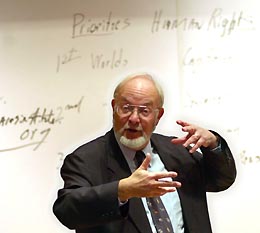|
This is an archived article.
For the latest news, go to the
Advance Homepage
For more archives, go to the Advance Archive/Search Page. | ||
|
Humanitarian Crisis Must Be Addressed, All countries, including the United States, should give up weapons of mass destruction and instead establish "instruments of mass salvation," such as health care, says the Rev. Robert Evans, a human rights advocate who has twice been nominated for the Nobel Peace Prize. "We need to destroy all weapons of mass destruction, no matter who owns them, and we need to invest time and energy in creating instruments of mass salvation: health inoculations, new treatments for HIV and AIDS, economic development, agriculture, energy, and aid," he said in a talk at the Thomas J. Dodd Research Center March 31. "We've got the technology, we've got the money, what we lack is the will. We could save hundreds of thousands of lives."
Evans is a founding executive director of the Simsbury-based Plowshares Institute and senior fellow of the Centre for Conflict Resolution at the University of Cape Town, South Africa. An ordained Presbyterian pastor, he traveled to Iraq in January as a member of a delegation of religious leaders visiting the country under the auspices of the National Council of Churches. The group visited schools and hospitals, and met with Iraq's religious leaders - both Muslims and Christians - seeking to establish a role for humanitarian inspectors in the country. Members of the group also met with some of Iraq's political leaders, and Evans said he personally criticized those he met for the country's human rights record. He said Iraq, once the most prosperous and progressive state in Middle East, had become a Third World country since Saddam Hussein came to power in the late 1970s. "Saddam Hussein is a brutal and repressive dictator, there's no doubt about that," he said. Through the Iran-Iraq war of the 1980s, the 1991 Gulf War, and the past decade of economic sanctions imposed by the United Nations, he said, "Iraq's prosperous economy declined radically, its infrastructure was destroyed, and many men died." Although the intent of the sanctions was to punish Saddam Hussein for invading Kuwait, the effect was the opposite, Evans said: "Sanctions literally crushed the Iraqi middle class who might have been able to change the leadership." By the mid-1990s, 90 percent of the Iraqi population was living on food packages distributed by the United Nations, he said, and the U.N. Children's Fund has showed that at least 500,000 Iraqi children under five died directly because of sanctions. Evans said he does not see war as the answer to the problems in Iraq, however. He said the United Nations has forecast that the current conflict will precipitate a humanitarian catastrophe, with up to 100,000 deaths and up to 1.5 million refugees. Noting that there is widespread opposition worldwide to the war with Iraq, he predicted that "this war will make us less secure, not more secure. We are in the process of generating not hundreds but thousands of new terrorists." He said there are alternatives to war, including diplomatic alternatives such as those proposed by several Middle Eastern countries, and disarmament alternatives. Evans, who has written several books on human rights, traced the roots of the current conflict to a clash of values, noting that there is no consensus about the meaning of the term "human rights." At the heart of human rights are the notions of equity and liberty, he said, but different countries interpret these concepts in different ways and emphasize different rights: capitalist countries stress civil and political rights; the few remaining socialist countries focus on such rights as health, housing, and work; and developing countries place priority on basic rights to food, shelter, and security, he said. "This moment in history is the greatest crisis we have had in 20 years on issues of human rights," he said, "both in the United States and in the world." Evans cautioned that opposition to the war should not be construed as support for Saddam Hussein: "People are not for Saddam Hussein if they're against the war." He acknowledged that not everyone would agree with his views and invited the audience to engage in dialogue with him and with each other. "It is a mistake to demonize those we disagree with," he said. "Talk to your neighbors, talk to your students. Every professor at this university ought to have the war as a major item in the classroom." Evans' talk was sponsored by the Mansfield chapter of the World Federalist Association. |

